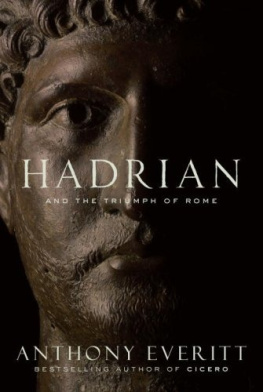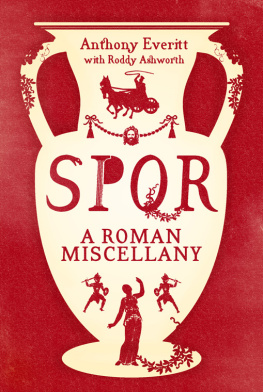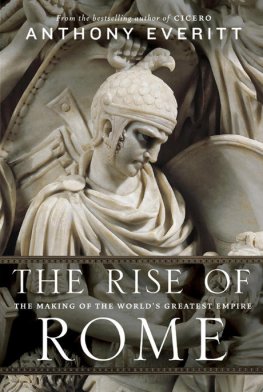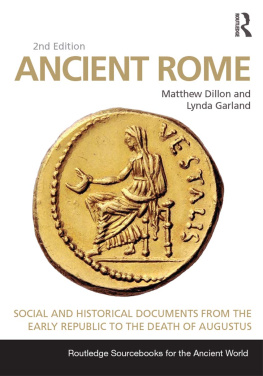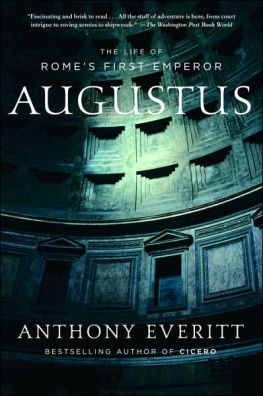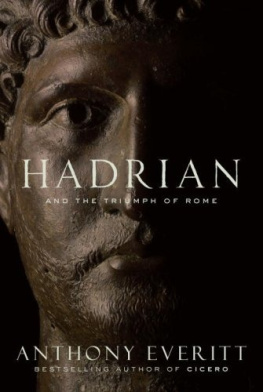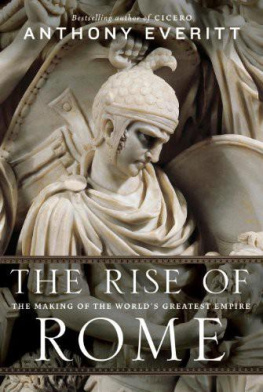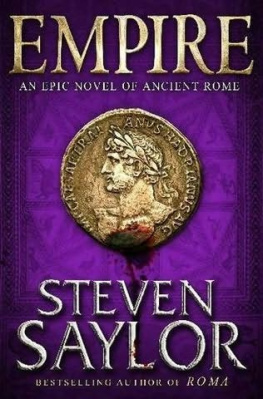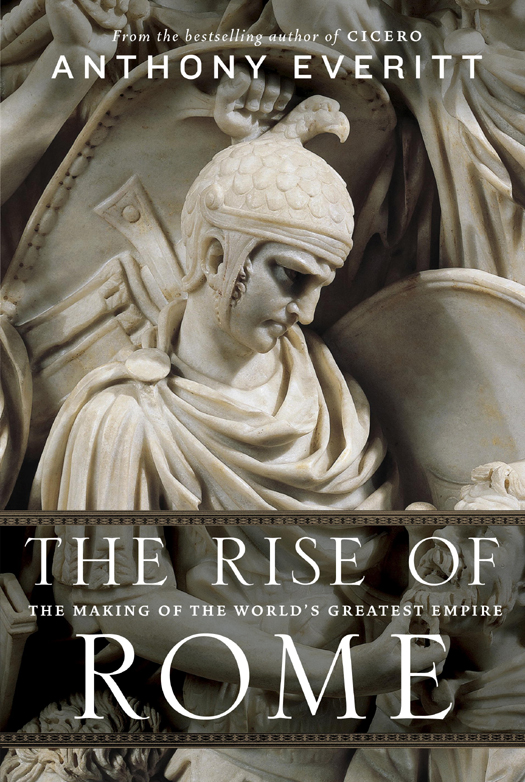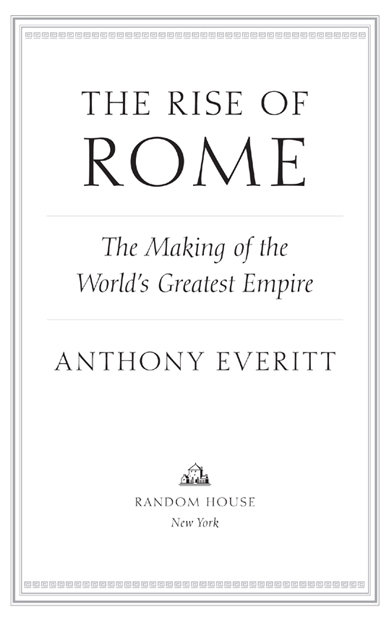Copyright 2012 by Anthony Everitt
Maps copyright 2012 by David Lindroth, Inc.
All rights reserved.
Published in the United States by Random House,
an imprint of The Random House Publishing Group,
a division of Random House, Inc., New York.
R ANDOM H OUSE and colophon are registered trademarks of Random House, Inc.
Grateful acknowledgment is made to Penguin Group (UK) for permission to reprint approximately 1,202 words from The Rise of the Roman Empire by Polybius, translated by Ian Scott-Kilvert, selected with an introduction by F. W. Walbank (Penguin Classics, 1979), copyright 1979 by Ian Scott-Kilvert; approximately 856 words from The Early History of Rome: Books IV of The History of Rome from Its Foundation by Livy, translated by Aubrey de Slincourt with an introduction by R. M. Ogilvie (Penguin Classics, 1960. Reprinted with a new introduction 1971), copyright 1960 by the Estate of Aubrey de Slincourt, introduction copyright 1971 by R. M. Ogilvie; approximately 146 words from Rome and Italy: Books VIX of The History of Rome from Its Foundation by Livy, translated and annotated by Betty Radice, introduction by R. M. Ogilvie (Penguin Classics, 1982), copyright 1982 by Betty Radice, introduction copyright 1982 by the Estate of R. M. Ogilvie; approximately 439 words from The War with Hannibal: Books XXIXXX of The History of Rome from Its Foundation by Livy, translated by Aubrey de Slincourt, edited with an introduction by Betty Radice (Penguin Classics, 1965), copyright 1965 by the Estate of Aubrey de Slincourt; approximately 137 words from Rome and the Mediterranean: Books XXXIXLV of The History of Rome from Its Foundation by Livy, translated by Henry Bettenson, introduction by A. H. McDonald (Penguin Classics, 1976), copyright 1976 by Henry Bettenson, introduction copyright 1976 by A. H. McDonald. Reprinted by permission of Penguin Group (UK).
Library of Congress Cataloging-in-Publication Data
Everitt, Anthony.
The rise of Rome: the making of the worlds greatest empire/Anthony Everitt.
p. cm.
eISBN: 978-0-679-64516-0
1. RomeHistoryEmpire, 30 B.C .284 A.D . 2. Rome HistoryEmpire, 284476. I. Title.
DG276.E84 2012
937.63dc23 2011048318
www.atrandom.com
Cover design: Anna Bauer
Cover photograph: G. Dagli Orti/De Agostini
Picture Library/ Getty Images
v3.1_r1
PREFACE
F ROM EDWARD GIBBON ONWARD, HISTORIANS HAVE pondered the decline and fall of the Roman Empire. But how was the empire won? What was it that enabled a small Italian market town by a ford on the river Tiber to conquer the known world? I seek to answer these questions by telling the story of the rise of Rome. This is the first time in many years that an account of the Roman Republic has been written for the reader with a general interest in history, and more particularly in the origins of the West. It is a taster of the treasures in store for anyone who wishes to dig deeper into the subject.
THIS REMOTE PAST is worth the trouble of exhuming because the Romans remain relevant to us. They still inspire us, still have an effect on how we view social, political, and moral values. We live in a world they made.
The idea of Rome is imprinted on our genes. It has generated proverbs, maxims, and phrases that we use in our everyday lives with scarcely a thought for their old significance: all roads lead to Rome, the grandeur that was Rome, when in Rome do as the Romans do, Rome wasnt built in a day, Rome the eternal city.
Every few years, Hollywood produces a film that re-creates this vanished civilizationamong them Gladiator, Spartacus, Ben-Hur, and Quo Vadis. We stand in awe of Roman power and ruthlessness. We are frightened, but also enthralled, by their Gamesthe bloodstained entertainments in which gladiators fought one another for the amusement of huge audiences.
The Romans were a practical people fascinated by engineering. They pioneered the art of building long-lasting roads. They showed how living in towns could be comfortable and civilized, even if mainly for the rich.
A community is not just about bricks and mortar. The Romans were practical in another way, for they believed deeply in the rule of law. From their earliest years, they created a legal system, which they went on improving throughout their history. Roman law has influenced the legal systems of many modern European countries and also that of the United States.
Although Latin died out as a living language after the Western Roman Empire came to an end in the fifth century A.D. , it has had a long afterlife. Until the 1960s and the Second Vatican Council, the religious services of the Roman Catholic Church were conducted in Latin. Even today, flowers and plants, and medical names for parts of the body and for diseases, are in Latin. The constellations in the night sky are called by Latin names and reflect the heroes and heroines of Greco-Roman legends. The names of many American institutionssuch as Senate, Congress, and Presidentcome from Latin. Courses in Latin are still offered in some high schools and in many colleges and universities. Translations of Romes poets and historians are on sale in American and European bookshops.
The founding fathers of the United States of America were brought up on the classics of Roman literature. They were fascinated by the Roman system of republican government. They liked its balance between three sources of power: kingship (all-powerful Roman consuls); oligarchy, or rule by a few noble families (the Roman Senate); and democracy, or rule by the People (the Roman citizens assemblies, which passed laws). The first Americans imitated this model and designed a three-part government, full of checks and balances, with a President, a Senate and a Chamber of Representatives, and a judicial system.
THE CITYS FOUNDATION myths and the events of its early centuries are almost entirely unhistorical, but they were what Romans believed of themselves. They are a rich and poetic feast that has nourished European civilization for two thousand years. It is only in the past few generations that our collective mind has begun to jettison them. If this book serves any purpose, it is as a reminder of what we are losing.
I reflect on the big themes and analyze the development of Roman politics, warfare, and society. But above all this is history as story, and I seek to bring to life the extraordinary personalities who lived itfrom Tarquin the Proud to Marius, from Coriolanus to Sulla, from Scipio Africanus to the brothers Gracchi. The most charismatic of them all was not even a Roman but the man who came closest to destroying Romethe great, tragic, embittered Hannibal.
One of the curious features of Roman history is that it often suggests parallels between then and now, but such comparisons can be dangerous, and I leave readers to make their own connections unaided.
AN UNQUENCHABLE LEGEND underpins the hopes and ambitions of many of the actors in this long dramathat of the siege and sack of the city of Troy (or Ilium, as Homer had it in his epic poem the Iliad) and the tragic heroism of the Greek warrior Achilles, doomed to die young but glorious. A latter-day Achilles, the astounding Alexander the Great, also blazed a trail that many young Greeks and Romans, from Pyrrhus to Pompey, did their best to emulate. And it was generally agreed that Rome was Troy reborn, ready to avenge itself on the once victorious Greeks. When he invaded Italy, Pyrrhus (also the name of Achilles son), the king of Epirus, believed that he was refighting the Trojan War, and mythical divinities, such as Jupiters wife, Juno, and the demigod Hercules, were deployed by Hannibal as weapons in his propaganda campaign against Rome.



